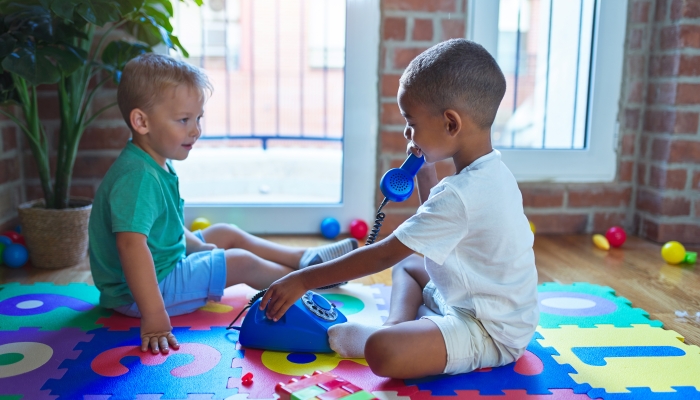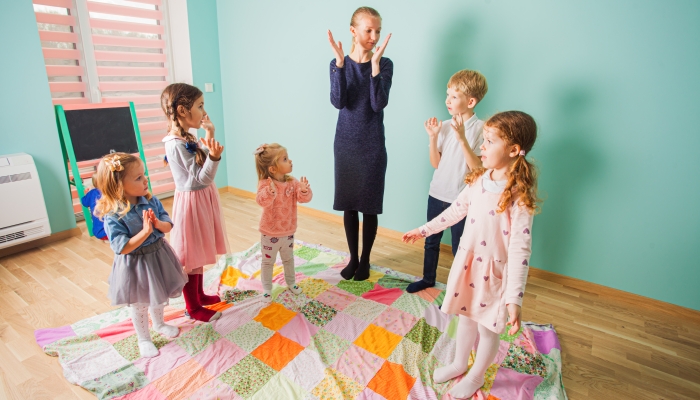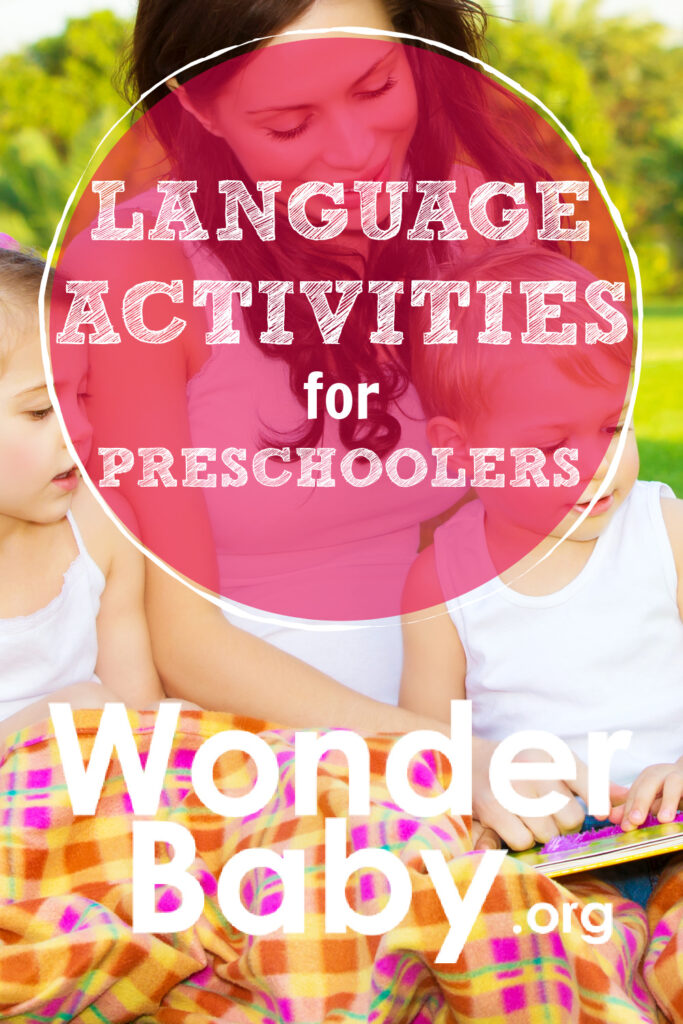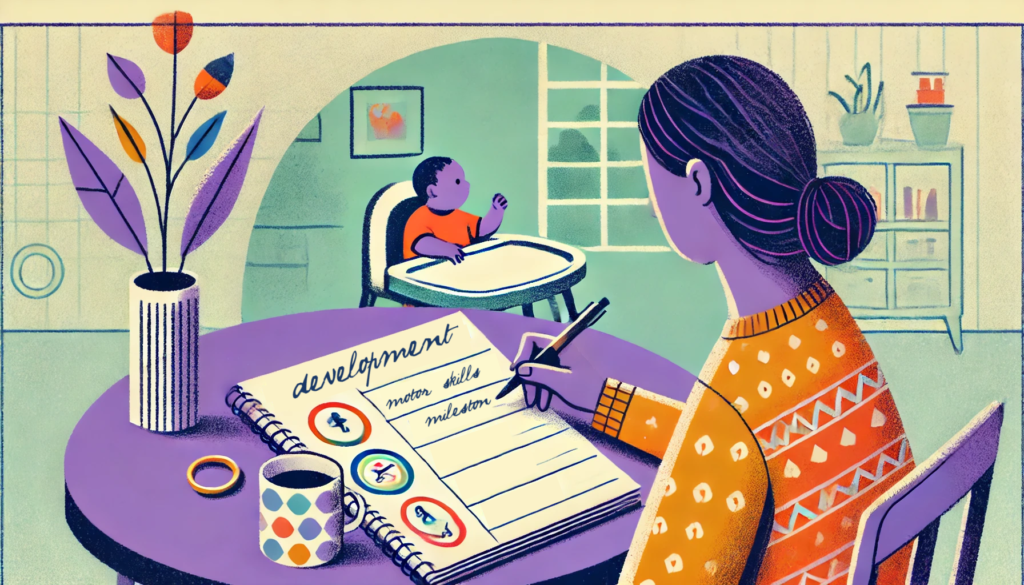11 Language Activities for Preschoolers

- Preschoolers learn language skills just as babies do—through listening to and interacting with the people around them.
- A child’s inability to communicate or interpret information correctly can lead to frustration.
- Effective communication requires receptive and expressive skills—or listening and speaking skills.
Before my days of motherhood began, I was an elementary school teacher. My favorite part about that career was watching children develop in areas like fine motor skills, reading skills, or other milestones.
In addition to basic academic skills, I also had the joy of aiding children who spoke other languages and helping them learn the language. Making accommodations for English learners was something I had never thought about before that. It caused me to wonder how children feel who struggle with the English language.
I also realized that it’s not just children of other languages who need those accommodations. English-speaking children can still struggle with language and oral motor skills. I quickly realized that individual attention, instruction, and patience are key to helping these children.
If you’re looking to help your little one develop their language skills, look no further. You don’t need a special degree or curriculum to get started. With these language activities for preschoolers, you’ll be able to quickly start them on the path to solid communication.
Language Development in Preschoolers: What You Need to Know
If you’re new to language development, have no fear. There are just a few basic things you need to know when teaching preschoolers language skills.
How do preschoolers learn language skills?
Preschoolers learn language skills just as babies do—through listening to and interacting with the people around them.
After a baby is born, no one drills the child with flashcards of common sounds, words, or phrases. Babies learn the language by listening to the adults and children around them. These sounds, words, and phrases eventually make their way out as they learn to speak their first words.
Preschoolers learn language skills in a similar way. Although by this age, they aren’t just listening to the world, they’re interacting with it. They learn to communicate by listening to others and talking back through reciprocal conversation
Preschoolers will learn the majority of language through daily life and play. For example, cooperative play, one of the primary stages of play, allows children to engage in fantasy play with other children and further develop language skills.
What are the key components of preschool language development?
Preschool language development includes 5 main components. These are:
- Phonology: Recognizing and manipulating sounds in words.
- Syntax: Joining words and phrases to make sentences.
- Semantics: Understanding the meaning of words and phrases.
- Morphology: Understanding the smallest parts of words.
- Pragmatics: The understanding of social cues and context for appropriate language.
On top of those, language can also be broken down into receptive language skills and expressive language skills. Receptive skills are needed to accurately decode and retain the information heard. Expressive skills are required to communicate through words, gestures, signs, etc.

What Are the Language Milestones of Preschoolers?
The American Academy of Pediatrics issued age-appropriate speech and language milestones for children. The milestones for 4 to 5-year-old children include:
- Understanding words for both time and order.
- Follows longer directions.
- Hears and understands most information they hear.
- Talks without repetition most of the time.
- Can name the letters of the alphabet and numbers.
- Can hold conversations.
- Can tell a simple story.
- Uses social context and cues to adjust how they speak.
How Important Is Language Development to Preschoolers?
Proper language development is crucial for both children and adults. Language is a skill that continues to develop over time and should be a priority for development.
How does language affect child development?
Language development in children has obvious, immediate effects. When a child can’t communicate or interpret information correctly, it can lead to frustration. This might also lead to embarrassment in front of peers or low self-esteem.
A 2010 comparative study published in Pediatrics by Ingrid Schoon, Samantha Parsons, Robert Rush, and James Law, titled Children’s language ability and psychosocial development found that early language development significantly impacted adulthood. The study states that “early receptive language skills are significantly associated with adult mental health as well as psychosocial adjustment during early childhood and in later life.”
How to Encourage Your Preschooler to Learn Language Skills
Teaching language skills to your preschooler doesn’t have to be difficult or complicated. You can start by including these suggestions in your daily routine:
- Ask open-ended questions.
- Read a variety of books.
- Retell stories with your child.
- Ask your child questions about what they see.
- Model correct grammar and longer sentences.

11 Language Activities for Preschoolers
During my experience teaching language development skills, these were some of my favorite activities to include in my lessons. Use these simple expressive and receptive language activities to help your child gain confidence with language skills:
Sing Songs
Who knew choosing fun kid songs to sing together would be an excellent language-learning experience for your preschooler? Memorizing the lyrics to silly songs will come naturally to your child as they listen again and again.
Read Aloud
Of all the language activities I’ve tried, reading aloud is my favorite. It doesn’t matter if you read aloud from picture books or simple chapter books. This activity will build crucial literacy skills while allowing you to snuggle and bond with your child.
Recite Nursery Rhymes
Memorizing and reciting nursery rhymes will help your child develop vocabulary and syntax skills. The more you repeat them, the greater reinforcement they’ll gain of new words and sentence structures.
Show and Tell
What child doesn’t love showing others their favorite toys or special items? Many children begin this activity in their preschool or kindergarten classrooms. You can help your child develop the key communication skills needed by practicing “Show and Tell” at home.
Build a Story
After dinner in our home, we often bring out our “build-a-story” card deck that features random fairy tale pictures on each card. In this game, the first person draws a card and begins a story based on the picture they picked up. The next person also draws a card and adds an element to the story.
You can play this without special cards simply by starting a story and allowing everyone to add one sentence. This game encourages expressive language development and communication skills.
Play Telephone
The “Telephone Game” is a silly game of listening and repeating. This makes it perfect for developing expressive language skills as well as receptive language skills. Your child will need both to properly play the game.
Recite Fingerplays
Many of us are familiar with fingerplay rhymes like “Ten in the Bed” or “5 Little Monkeys.” Introducing your child to these repetitive poems or songs will help with vocabulary development. They also make fun fine motor activities for preschoolers.
Play Letter-Sound Hunt
This is an easy way to encourage language development at home or in the car. Pick a letter sound and see who can find the most objects that start with that letter. It’s like a literacy scavenger hunt that will keep kids engaged.
Make Letters with Playdough
Preschoolers love playdough, so this makes a fantastic letter recognition game for that age. Use alphabet mats or written letters in a page protector to give children a guide for forming letters. As they play, have them make the sound that goes along with the letter.
Using playdough to form letters will also strengthen visual motor skills.
Play Rhyming Games
One of our favorite car activities for toddlers is playing a rhyming game through songs. We’ll often sing a song like Down by the Bay and come up with our own silly rhymes to finish the lyrics. This ends up being a fun activity for all and a great way to develop language skills.
Another rhyming game we love to play is one we call “Guess What’s in My Pocket.” One person will start by saying, “Guess what’s in my pocket. It rhymes with ___.” Then everyone gets one guess at what the word might be.
Create a Language Rich Environment
In the classroom environment, I always made sure to have plenty of printed words around the room. Labeling simple items like doors and windows gave my English learner children more opportunities to learn the language. I changed the words throughout the year and hung posters with different themes to keep it challenging.
Making your home a language-rich environment can include printed and spoken words. Displaying beautiful prints with words, picture books, or labeled containers will help your child as they learn to read. Creating a culture of conversation and open-ended questions in your home will give your child plenty of practice with effective communication.
FAQs
What is the critical period for language development?
Some researchers have differing views on the exact ages for the critical period for language development. However, it’s generally thought to be somewhere from birth to puberty. This is the window of time when language is most easily learned.
Can children learn a language without interaction?
Language requires both receptive and expressive skills. If a child only hears a language but never gets a chance to interact, they are missing a huge component of the language. This will lead to ineffective communication.

Related Posts

Development, Special Needs
How to Track Milestones for Developmentally Delayed Babies
Parents of developmentally delayed babies can explore practical tools and strategies to track milestones, celebrate progress, and support their child’s unique developmental journey.

Fine and Gross Motor
5 Alternatives to Tummy Time for Babies with Motor Development Challenges
Does your baby struggle with tummy time due to motor development challenges? These alternatives to tummy time will offer the same benefits.

Development
Should Twins Share a Room?
Wondering if your twins should share a room? We’ll explore the pros and cons of room-sharing for twins right here before you make your decision.